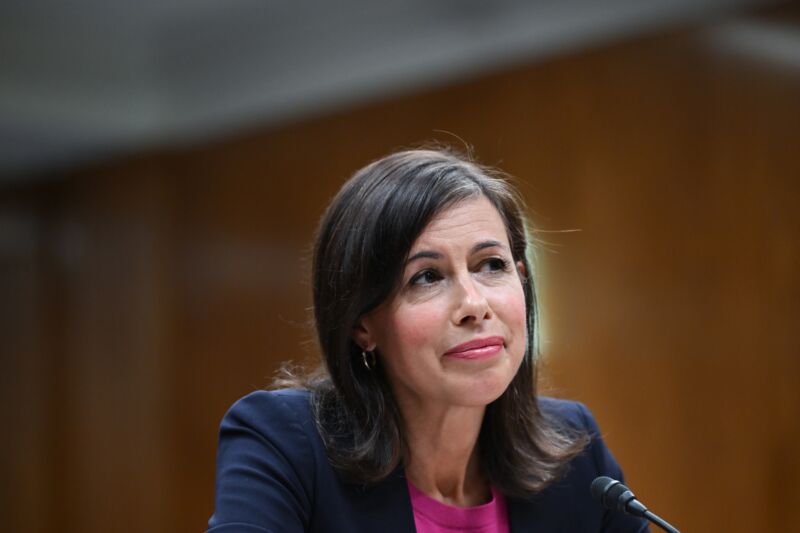
Getty Images | The Washington Post
FCC Chairwoman Jessica Rosenworcel defended a low-income discount program against attacks from GOP lawmakers, pointing out that Republicans criticized an aspect of the program that was decided by Congress, not the commission.
In December, Sen. Ted Cruz (R-Texas) and several other Republican lawmakers blasted the Affordable Connectivity Program (ACP), which gives $30 monthly broadband discounts to people with low incomes. The program is set to be discontinued in a few months because Congress hasn’t added funding to continue it, though Democrats are pushing a bill that would keep it going.
The Republican letter to Rosenworcel accused the Federal Communications Commission of being “wasteful,” saying that “it appears the vast majority of tax dollars have gone to households that already had broadband prior to the subsidy.” Rosenworcel has since responded in a letter reminding Republicans that the FCC followed Congress’ instructions when it implemented the ACP.
Congress ordered the FCC to implement the program in the 2021 Infrastructure Investment and Jobs Act, also known as the Bipartisan Infrastructure Law. While Republicans complain that the program is giving discounts to people who previously had broadband, Rosenworcel said it is working as Congress intended. She wrote:
The Commission administers the ACP in a manner consistent with the Bipartisan Infrastructure Law. In the law, Congress identified a series of programs—including Medicaid, the Supplemental Nutrition Assistance Program, Pell Grants, and Veterans and Survivors Pension Benefits—that qualify households for participation in ACP. The Commission does not have general authority to add or subtract from this list in the Bipartisan Infrastructure Law. Nor does it have the ability to condition this list on other requirements or limit it to new broadband adopters.
“As a result, providing the ACP benefit for both new adopters and existing low-income subscribers is consistent with the law,” Rosenworcel wrote in the letter that was sent on January 5 and posted on the FCC website this week. “It also assists with closing the digital divide. Indeed, data shows that a sizeable number of low-income households experience subscription vulnerability after they adopt broadband, meaning their service may be disconnected due to inability to pay.”
Republicans asked chair to “correct” her testimony
While the Bipartisan Infrastructure Law did have some Republican support, the four Republicans who criticized the program voted against it. Besides Cruz, the December 2023 letter was signed by Sen. John Thune (R-SD), Rep. Cathy McMorris Rodgers (R-Wash.), and Rep. Bob Latta (R-Ohio).
Their letter disputed Rosenworcel’s testimony at a November 2023 House hearing in which she warned that millions of households could lose Internet access if Congress doesn’t renew the ACP discounts. “We need Congress to continue to fund this program,” Rosenworcel said at the hearing. “If Congress does not, in April of next year, we’ll have to unplug households and, based on current projections, it’ll be about 25 million households we will unplug from the Internet in April.”
The Republicans’ letter called Rosenworcel’s statement “deeply misleading” and asked her to supplement her testimony “with the correct information about the number of Americans that will ‘lose’ broadband if the ACP does not receive additional funds.” Their letter also criticized “the Biden administration’s reckless spending spree” and questioned whether the ACP is worth paying for on a longer-term basis.
Because money is due to run out in a few months, the FCC has started winding down the program and said it will stop accepting new enrollments on February 7. The FCC likely won’t hit the 25 million-household mark that Rosenworcel projected, but her letter said that over “22 million households are receiving affordable broadband service from approximately 1,700 participating providers.”
Democrats seek $7 billion
Congressional Democrats last week filed the Affordable Connectivity Program Extension Act, a proposal to provide $7 billion for the program. The Biden administration previously requested $6 billion to fund the program through December 2024.
Meanwhile, a bipartisan group of 174 mayors from across the US urged Congress to keep the ACP going.
“The fact that the Affordable Connectivity Program was enacted into law as a part of the Bipartisan Infrastructure Law is not lost on us—it’s a program that has wide support,” the mayors wrote in a letter to lawmakers. “From Democrats to Republicans, to rural and urban areas, to the telecommunications industry and all levels of government, the Affordable Connectivity Program is recognized by all as successful.”
Rosenworcel also noted the bipartisan support in her response to GOP lawmakers. “The ACP has broad bipartisan support from members of Congress and Governors across the country and has been an important part of our efforts to help close the digital divide nationwide,” she wrote.
She said the program “has been particularly successful with helping low-income households obtain fixed broadband service, a service that has long suffered from lower adoption rates by low-income households.” Her letter said that nearly 10 million households are getting discounts for home Internet service through the ACP, which can subsidize either home or mobile Internet.

